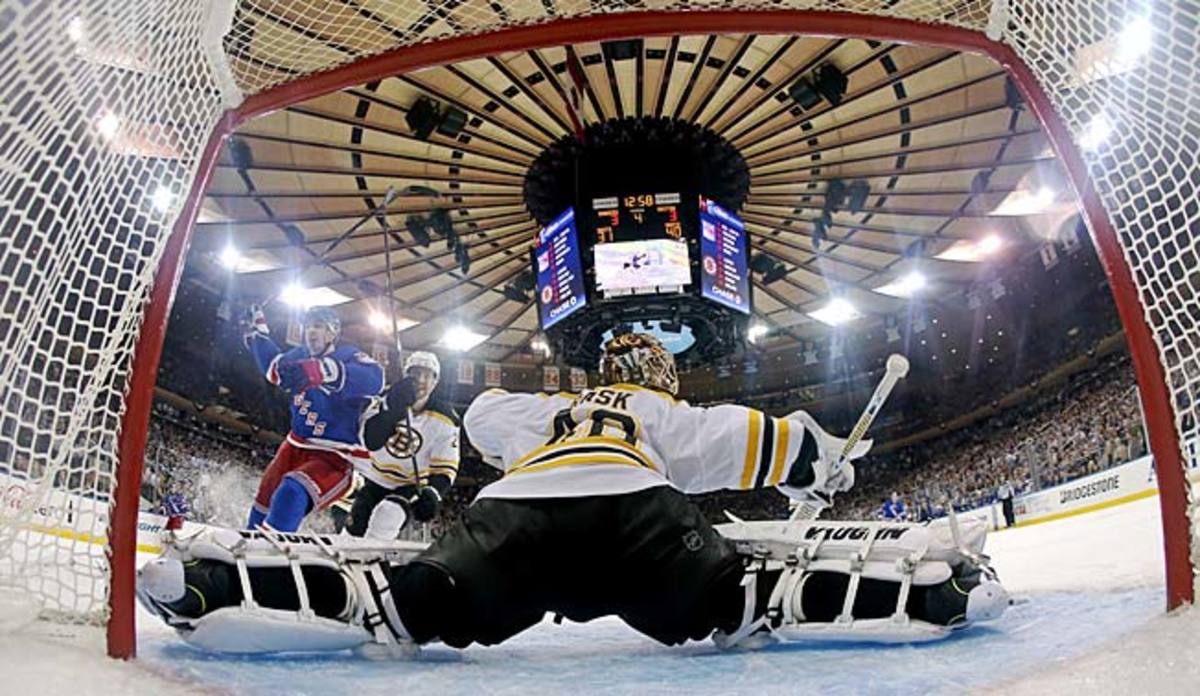NHL playoffs: The elimination game myth, Toews woes, more notes
Does it matter that Tuukka Rask was in net during Boston's epic 2010 collapse? (Bruce Bennett/Getty Images)
By Sarah Kwak
It’s a well-worn cliché of playoff hockey: The fourth win is always the toughest. And on Thursday night, Boston played into the old adage again, letting the Rangers keep a modicum of hope in their Eastern Conference semifinal series, which now stands at 3-1. Friday, Pittsburgh, holding a 3-1 series lead over Ottawa, got its first chance to advance to its first East final since 2009. But given the Penguins’ recent history of elimination games on home ice -- they are 1-6 since Dan Bylsma took over in ’09 -- Friday’s game presented an element of challenge.
Elimination games often do. Just ask the Bruins, the Canucks, the Sharks. During the last three years, they have each allowed an opponent to climb back from a 0-3 series deficit to push a Game 7. The 2010 Flyers famously pulled off the full comeback against Boston, which haunted the Bruins until they won the Cup a year later. Since 2010, the NHL has seen only three more occurrences of series sweeps than it’s seen 0-3 comebacks. So really, are elimination games actually more difficult?
Anecdotally, they certainly are. It always seems that teams have trouble closing out series. Since 2008, the Bruins, for example, have been stretched to seven games eight times and they've swept opponents only twice. They sincerely believe they’re built to win in a long, grinding series. In 2010 and 2011, the Penguins were unable to close out opponents, dropping two Game 7s in series that they had seemed to have under control.
So, facing elimination, teams are expected to play with a higher degree of “desperation.” They may take more risks or play with a greater physical edge.
But in reality, there isn’t a lot of evidence to suggest that win No. 4 is significantly harder to come by than the other three. It’s the myth of the elimination game. During the last four postseasons, in non-Game 7 elimination games, the team holding three wins is 35-37. No significant trend there. Granted, a number of the wins in that count came on the heels of a loss, but the overall record in first-chance elimination games is equally inconclusive. In postseason series since 2010, teams that have reached three wins have gone 24-29 in the next game. Yes, slightly more likely to lose, but not to a remarkable degree. It only seems like clinchers are harder to win.
GAME 4: Cazeneuve's take | Recap | Boxscore| Highlights | Complete postseason schedule
Rask worry?
Should the Bruins be worried about goalie Tuukka Rask, who gave up a couple of bad goals on fluky plays in Game 4 on Thursday night? After all, it was the 26-year-old Finnish goalie who was in net during the infamous Bruins collapse against the Flyers in 2010, and though Boston lifted the Cup the following spring, it was on the shoulders of a different goalie, Tim Thomas.
Is there any doubt about Rask?
Simply, no. The indisputable No. 1 in Boston now, he has long exhibited patience and maturity that has earned him respect throughout the Bruins organization. He’s cheery, yet calm, and has proved that he can deal with plenty of stresses, whether it’s jumping in for Thomas in 2010 or being unseated by him in 2011. He’s got patience and the trust of his coaches and teammates, which mean more than a couple of uncharacteristic mistakes.
Toews woes
The Blackhawks captain hasn’t scored a playoff goal in more than a year. He has been held pointless in seven of Chicago’s nine games during this postseason, and he seemed to lose his composure on Thursday night as the Blackhawks fell into a 3-1 series deficit against Detroit. It was an uncharacteristic display by a player who is so often lauded for his maturity, but now, his frustration is beginning to show. He took costly penalties, threw a fit, yelled at referees, and even needed teammate Brent Seabrook to swing by the penalty box to calm him down.

































